QuestionQUESTION: I just noticed today that my rabbit Shadow (6 month old male lop and a cutey!) is urinating a dark orange color. Should I be concerned and is there anything I can do to help him? Thank you for your time!
ANSWER: Hi Michele,
In most cases, the color of the urine is the result of normal metabolism of the pigmentation of the food. In many healthy, the urine has an orange tint to it.
At 6 months old, your rabbit is quickly becoming an adult. I would seriously consider neutering him. Neutering will make him a happier rabbit overall. They have a tremendous reproductive drive as in nature, they must produce many offspring to make sure there are sufficient numbers to sustain the species. The sexual tension is very stressful to them. They can become aggressive and usually spray urine. Neutering will also eliminate the possibility of testicular cancer....and we have a cancer survivor in our rescue. Unaltered males can spray urine quite a distance....it's hard to clean and smelly. Some are quite a good shot....we have one named Pistol Pete because he was so good at spraying...key word is "was".
I would also suggest making sure he is getting a proper diet for an adult. An adult rabbit should be getting a low protein/high fiber diet. A diet too high in protein can stress the kidneys and cause some urinary issues. The primary component of the diet should be unlimited grass hay such as timothy, orchard grass, brome, oat or bermuda to name a few. This provides the necessary bulk in the diet to provide a proper climate in the digestive system to keep things moving along. It also is the primary way to keep the teeth worn down. The primary cause of excess protein is pellets. Pellets should be of high qualtiy (pellets...not the food with the little colorful treats) and be limited. We feed our smaller rabbits (about 1kg...2.2 pounds) about 1/8 cup pellets per day and our Flemish Giants (about 12kg....25 pounds) about 1/3 cup per day. We use pellets to maintain weight and body conditioning and they are not a "complete food". We offer veggies/greens in moderation and very rarely offer fruits or treats. Holland Lops should be considered small rabbits....and if he is a Mini-lop....the lower end of mid sized rabbits.
I would also pay close attention to his water intake. Monitor his water intake daily....and measure the amount he is taking. Let me know how much he weighs and how much water he drinks. I have a formula for determining proper water intake.
There are some special issues if your rabbit is a Holland Lop. Hollands are very special to us and we have quite a few. We have nearly every breed so we have been able to seen particular trends in breeds....but Hollands are a favorite around here.
But I really suspect your concern is pretty normal....but watch the protein intake to protect the kidneys.
---------- FOLLOW-UP ----------
QUESTION: Oh my goodness I have been giving him too many pellets! This is my first bunny (but he is very special to my daughter and I we got him after her father left and my mom passed away!), and I have been giving him almost 1cup every 2 days and he is only about 2-2 1/2 pounds! He seems to drink a lot of water and I give him unlimited timothy hay. I will cut his pellet down let you know his water intake exactly. I usually give him a handful of kale a day is that ok and fruit 2-3 times a week (small amount which he loves!). I will find out his weight when I have him neutered (which will be soon because we have already experienced the "water cannon" and my 10 year-old was disgusted!). Thank you for all your help!
AnswerHi Michele,
LOL....so you have experienced the cannon. They have no shame at what they aim at.
Bring the amount of pellets down slowly....reduce a little amount each day for a week to ten days. Never make abrupt changes either in amounts of food offered or type of food....and that goes for anything you feed. Nothing good happens fast with a rabbit. Slow and calculated changes.
Too many pellets have wide effects. First, it can cause very painful molar spurs. Rabbits have 6 incisors (4 upper arcade and 2 lower arcade) and a mouth full of molars. They are all open rooted which means they constantly grow. The molars are curved. The pellets pularize easily and don't require any work on the teeth's part. Watch your rabbit eat....he doesn't chew up and down...it's from side to side. In a properly occluded jaw (when all the teeth line up properly) this is the action that wears the teeth down to proper levels. That is where loose hay comes in so well...they actually fold hay into something that looks like an accordian and that helps the transit time in the digestive system and keeps it moving along. Offer all different types of grass hays. We offer a "buffet" which encourages a more natural foraging type behavior, it gives them something to do and it's a lot of fun watching them go after one particular strand of hay. There are several providers of high quality hay on the internet....I also have several suppliers that ship all over the US. And a more economical way is to find the horse community....any hay that is safe for a horse is safe for a rabbit. We use horse hay in litter boxes and our buns eat it too. Pellets were also made for the meat rabbit industry so they could "fatten them up" quicker. If you feed these pellets that contain 14%-18% protein (far more than a rabbit's gut needs) you get a fat rabbit. A fat rabbit will most likely suffer from Hepatic Lipidosis....aka Fatty Liver Disease. This is nearly always fatal. The extra protein stresses the kidneys. And too rich a diet can have a devastating effect on the beneficial bacteria in the cecum and that will lead to some serious GI issues. And one final benefit of feeding limited pellets....it's an early warning system. Since most rabbits eagerly devour pellets....if you free feed them and they stop eating, you might not notice for days and that can be deadly. So by feeding a limited amount, you get a healthier rabbit and if they stop eating...you know immediately.
As far as the neuter....a few suggestions to discuss and settle with your vet prior to surgery. You should not remove food or water prior to surgery. We do remove pellets the morning of the surgery. But we do not remove hay or water. We have had rabbits eating as they went into surgery. If a staff member at the clinic tells you to "fast" your rabbit....alert the vet or practice manager as some training is in order. If your vet tells you to remove food....cancel your appointment and find a rabbit savvy vet. Make sure you get pain meds to take home. They do get an injection, most of the time it's a narcotic called Buprenorphine. Some vets will tell you it's good for over a day. It's not....it's good for 12 hours max. Some vets will send home Metacam (which is a NSAID similar to our Tylenol). It is better than nothing but a narcotic aspect such as Buprenorphine or Tramadol will make for a much quicker recovery. Many vets are unaware of the value of Tramadol used in a rabbit.
Start cutting those pellets back a little each day until you get down to about 1/8 cup per day. Then adjust as needed to maintain weight. The amount may be a little more or a little less depending on your rabbit's metabolism and the nutrtional content of the pellet. And thanks for the chuckle tonight....watch out for that cannon!!

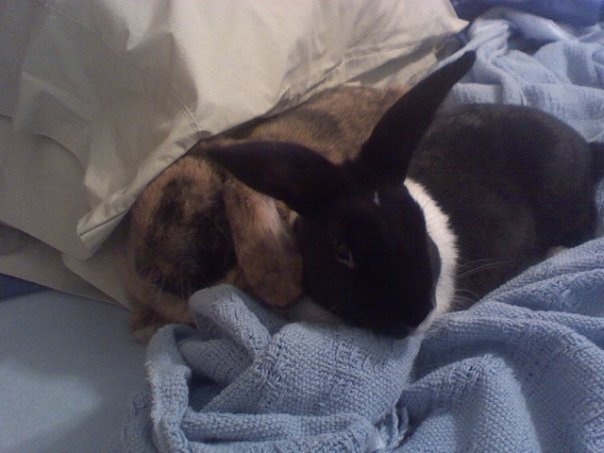 soft stool/sneezing
Question
Cooper & Marley
Hello, I have 2 male neut
soft stool/sneezing
Question
Cooper & Marley
Hello, I have 2 male neut
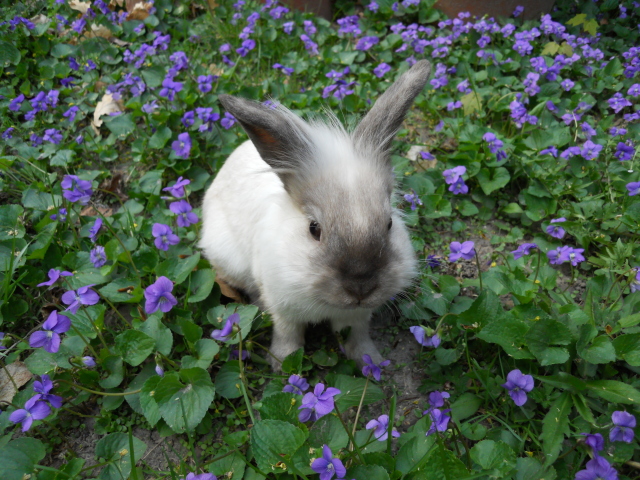 Cannot figure out my bunnies mood swings and type...
QuestionMeko
QUESTION: Okay, I bought my rabbit
Cannot figure out my bunnies mood swings and type...
QuestionMeko
QUESTION: Okay, I bought my rabbit
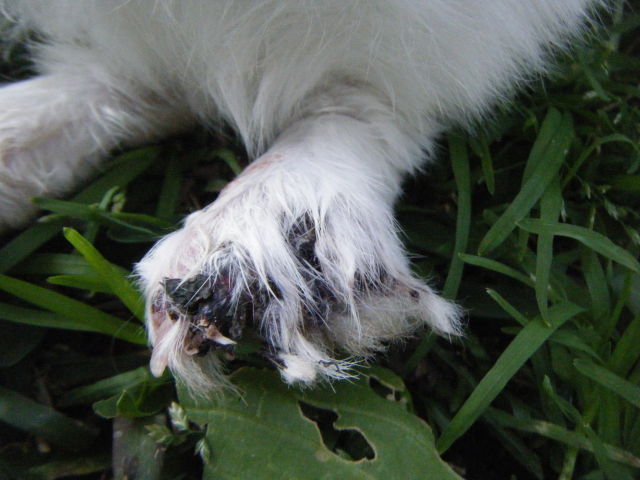 injured stray rabbit
Question
her left hind foot
We found a stray white rabb
injured stray rabbit
Question
her left hind foot
We found a stray white rabb
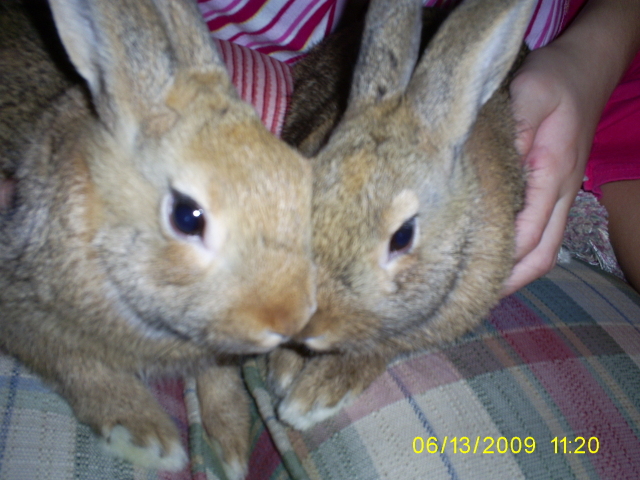 aggressive pregnant doe
QuestionQUESTION: Our doe has always been loving.
aggressive pregnant doe
QuestionQUESTION: Our doe has always been loving.
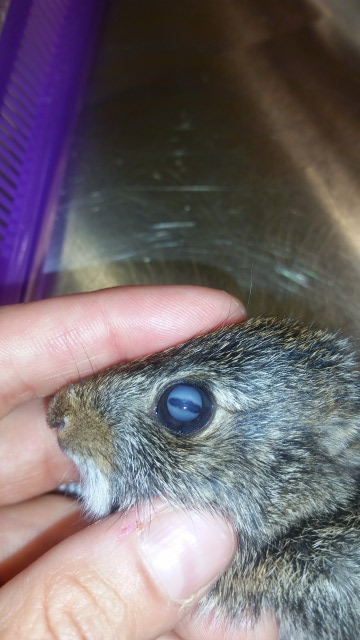 Eastern Cottontails
Question
ECT eye ECT eye
Hello Dr. Krempel
Eastern Cottontails
Question
ECT eye ECT eye
Hello Dr. Krempel